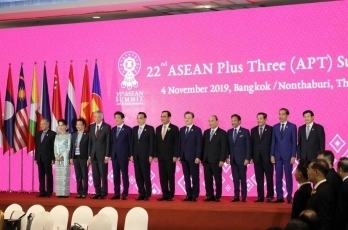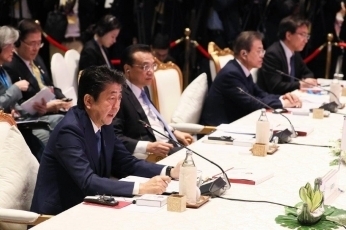Japan-ASEAN Relations
22nd ASEAN Plus Three (Japan-China-Republic of Korea) Summit Meeting
November 4, 2019
 Photo: Cabinet Public Relations Office
Photo: Cabinet Public Relations Office
 Photo: Cabinet Public Relations Office
Photo: Cabinet Public Relations Office
On Monday, November 4, from 8:50 a.m. to 10:10 a.m. (local time), the ASEAN Plus Three (APT) Summit was held in the Kingdom of Thailand. Mr. ABE Shinzo, Prime Minister, attended from Japan. The overview of the meeting is as follows.
1 Opening remarks
Following statements from Thailand as the Chair of ASEAN, China, and the Republic of Korea (ROK), Prime Minister Abe made opening remarks followed by the comments below. Thailand conveyed a message of sympathy to those affected by the recent typhoon in Japan.
(1) General remarks
- I welcome the “ASEAN Outlook on the Indo-Pacific (AOIP).” Japan intends to pursue synergies between AOIP and the “Free and Open Indo-Pacific (FOIP)” advocated by Japan and contribute to enhancing connectivity for achieving a free and open Indo-Pacific.
- I welcome the APT Leaders’ Statement on connecting the connectivities initiative. Japan attaches importance to ASEAN centrality and unity, and will cooperate with ASEAN in a wide range of areas aimed at strengthening the ASEAN Community.
- At the G20 Summit in Osaka, the leaders endorsed the “G20 Principles for Quality Infrastructure Investment,” such as openness, transparency, economic efficiency, and debt sustainability. The summit’s participants included the leaders of China and the ROK as well as Prime Minister Prayut as the Chair of ASEAN. Quality infrastructure investment will strengthen regional connectivity and bring sustainable economic growth. The ASEAN connectivity projects of member countries should be promoted in line with these principles.
(2) ASEAN Plus Three cooperation promoted by Japan
- In light of the outcomes of this year’s G20 Summit in Osaka, Japan will promote cooperation in the areas of marine plastic litter and trade. Specifically, Japan will share with countries its “Osaka Blue Ocean Vision,” which aims to reduce additional pollution by marine plastic litter to zero by 2050, and encourage countries to participate in the framework.
- To achieve the Vision, Japan, in accordance with its “MARINE Initiative,” will support capacity building and infrastructure development for waste management in ASEAN member countries.
- Under the “ASEAN+3 Marine Plastics Debris Cooperative Action Initiative” announced last year, Japan will enhance its cooperation, including establishing a knowledge center in the Economic Research Institute for ASEAN and East Asia (ERIA) and supporting member countries with the establishment of their plans.
2 Review and future direction of ASEAN Plus Three cooperation
Prime Minister Abe explained the following points, primarily related to Japan’s efforts for APT cooperation.
(1) Economic issues (trade and energy)
- At the G20 Summit in Osaka, the leaders confirmed the importance of Data Free Flow with Trust. Under the “Osaka Track” launched on this occasion, Japan intends to deepen international policy discussions, including international rulemaking on e-commerce in the World Trade Organization (WTO).
- It is a problem that the WTO dispute settlement system has been unable to fulfill its intended functions. Japan will cooperate to increase momentum for WTO reform.
- Promoting free trade, Japan also intends to continue to expand free and fair rules throughout the world through the Trans-Pacific Partnership Agreement (TPP11) and the Regional Comprehensive Economic Partnership (RCEP) among others.
- Japan affirms the importance of energy transition that achieves energy security, economic efficiency, environmental suitability and safety. Japan will promote innovations, such as hydrogen energy and carbon recycling, and work with the international community to spread their usage in order to create a virtuous cycle of environmental protection and economic growth.
(2) Social issues
i. Health
Aging of the population is an unavoidable issue for the region. By promoting the Asia Health and Wellbeing Initiative, Japan aims to bring about a balanced and comprehensive healthcare system in Asia. It is critical to establish a system of sustainable health financing for promoting universal health coverage, and Japan will continue to provide necessary supports to this end.
ii. Disaster management
This year, Japan once again supplied rice to the Philippines and Myanmar under the ASEAN Plus Three Emergency Rice Reserve Agreement. Japan will also continue its supports for the Southeast Asia Disaster Risk Insurance Facility.
iii. Education
Japan will continue to coordinate with member countries to achieve high quality higher education while increasing student mobility in the region.
iv. Transnational crime
Japan will continue to provide supports to Asian countries with regard to terrorism and violent extremism, which is the root cause of terrorism. In this regard, in April of next year, Japan will host the Kyoto Congress for the first time in 50 years. High-level participants are expected to attend.
3 Exchange of views on regional and international affairs
Prime Minister Abe stated the following regarding North Korea.
Japan strongly condemns launches of ballistic missiles by North Korea, which are clear violations of United Nations Security Council (UNSC) resolutions. It is important that the international community remain united to support the U.S.-North Korea process toward the denuclearization of the Korean Peninsula. It is critical to maintain full implementation of the UNSC resolutions, including countering “ship-to-ship transfers”. Japan’s basic policy of seeking to normalize its relations with North Korea through comprehensive resolving outstanding issues of concern, such as the abductions, nuclear and missile issues, as well as settlement of the unfortunate past remains unchanged. I am determined to meet Chairman Kim Jong-un face-to-face without attaching any conditions. I would like to once again express my gratitude to all countries that have reached out to North Korea on the abductions issue. I ask for your continued understanding and cooperation toward the early resolution of the abductions issue.
From the ASEAN side, many countries noted on the cooperation and progress made in accordance with the APT Cooperation Work Plan (2018–2022), and expressed appreciation for the efforts of Japan, China, and the ROK for APT cooperation.
In addition, many countries stated the importance of countering the rise of protectionism currently facing the world and the region through APT cooperation, which overcame the financial crisis some 20 years ago. Furthermore, ASEAN welcomed the “ASEAN Plus Three Leaders’ Statement on Connecting the Connectivities Initiative” adopted at the Summit, and expressed expectations for deriving synergistic effects between this Initiative and the connectivity initiatives of member countries to strengthen connectivity in ASEAN and East Asia.
Regarding North Korea issues, a number of participating countries noted on the importance of resolving the issues through dialogue, achieving complete denuclearization of the Korean Peninsula, and implementing UNSC resolutions.
Japan strongly condemns launches of ballistic missiles by North Korea, which are clear violations of United Nations Security Council (UNSC) resolutions. It is important that the international community remain united to support the U.S.-North Korea process toward the denuclearization of the Korean Peninsula. It is critical to maintain full implementation of the UNSC resolutions, including countering “ship-to-ship transfers”. Japan’s basic policy of seeking to normalize its relations with North Korea through comprehensive resolving outstanding issues of concern, such as the abductions, nuclear and missile issues, as well as settlement of the unfortunate past remains unchanged. I am determined to meet Chairman Kim Jong-un face-to-face without attaching any conditions. I would like to once again express my gratitude to all countries that have reached out to North Korea on the abductions issue. I ask for your continued understanding and cooperation toward the early resolution of the abductions issue.
From the ASEAN side, many countries noted on the cooperation and progress made in accordance with the APT Cooperation Work Plan (2018–2022), and expressed appreciation for the efforts of Japan, China, and the ROK for APT cooperation.
In addition, many countries stated the importance of countering the rise of protectionism currently facing the world and the region through APT cooperation, which overcame the financial crisis some 20 years ago. Furthermore, ASEAN welcomed the “ASEAN Plus Three Leaders’ Statement on Connecting the Connectivities Initiative” adopted at the Summit, and expressed expectations for deriving synergistic effects between this Initiative and the connectivity initiatives of member countries to strengthen connectivity in ASEAN and East Asia.
Regarding North Korea issues, a number of participating countries noted on the importance of resolving the issues through dialogue, achieving complete denuclearization of the Korean Peninsula, and implementing UNSC resolutions.


